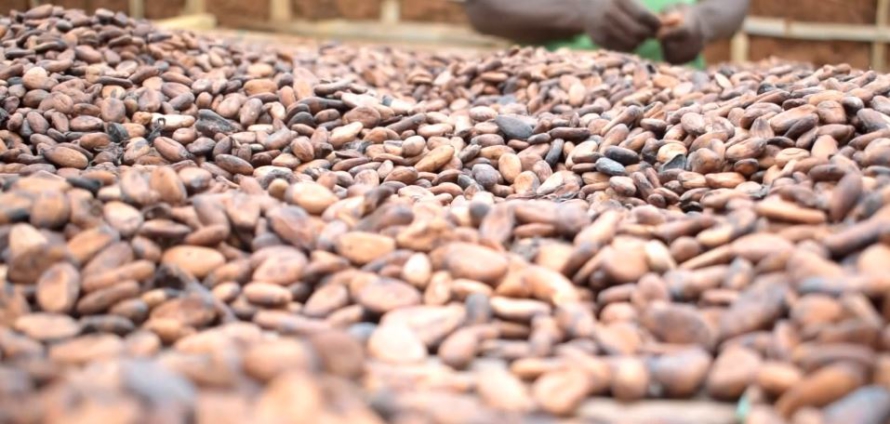Ghana’s cocoa processing units have been falling silent as a shortage of beans deepens in the world’s second-largest grower.
Cargill Inc., along with local firms Cocoa Processing Co. Ltd. and Niche Cocoa Ghana Ltd have all had to shut down their units intermittently over the last few months, according to people familiar with the matter. The companies declined to comment.
The effects are palpable on the streets around Cargill’s factory in Ghana’s port city of Tema. On a recent visit, the smoke-belching chimneys and the humming machinery were silent. Dry and dusty Harmattan winds replaced the chocolate-y aroma usually wafting outside.
The Harmattan is partly to blame for the crisis Ghana’s cocoa industry finds itself. Extreme weather has battered West Africa’s crop — first heavy rains swamped the fields, prompting the spread of disease and delaying harvest. Now the heat could further crimp production and keep global supplies on track to fall short of demand for a third season.
Such processing plants churn raw beans into products like cocoa butter and powder, which create the smooth, melty texture of chocolate bars and other sweets. From West Africa, much of that supply is typically bound for Europe and North America and any shutdowns signal to the shortages looming ahead.
The supply crunch has seen New York cocoa futures soar past records set in the 1970s and is set to make treats pricier.
The situation is “very serious, the market is very tight,” Paul Joules, a commodity analyst at Rabobank in London, said. “This is a mammoth concern for the industry and will undoubtedly have an adverse impact on future grindings.”
Ghana’s bean arrivals at ports through Jan. 12 dropped by about 30% compared to the last season. Apart from the deficit, the country’s strict market controls have also resulted in growers smuggling their output to neighboring countries in search of better prices.
Ghana’s neighbor and top-producer Ivory Coast is on the verge of a similar crisis.
For the main-crop harvest, which started October last year and ends in March, the industry regulator is in deficit to the tune of as much as 100,000 tons of beans on forward sales, Bloomberg reported last week. Bean arrivals at ports there are down nearly 38% to 1.08 million tons so far in 2023-24.
Units of Cargill, Barry Callebaut AG and Olam Group Ltd. are among companies that may be forced to stop their machines, the people said.
A spokesperson for Barry Callebaut noted the decline in Ivory Coast’s crop but refused to comment on “purchases or capacities in our production network.” Olam also acknowledged the shortages, but a spokesperson said the company was “well-positioned to continue fulfilling our customers’ needs.”
Cargill may “reduce its capacity,” a spokesperson said, “depending on how the situation evolves.”
The situation highlights that the current upward pressure on futures prices is far from over.
“The likes of black pod disease, swollen shoot, farmers exiting out of cocoa are not issues which can quickly be solved and this means global cocoa supply could be tight for many years to come,” Joules said. “Chocolate companies will be forced to pass on these higher prices to consumers.”
Latest Stories
-
2025 Mid-Year Budget: Economy is on steady course – Trade Expert
5 minutes -
Stanbic Investment Management Services Ltd announces strong 2024 performance
6 minutes -
Banking is necessary, but banks are not: Ghana’s digital finance disruption story
12 minutes -
Ghana set to sign bilateral debt agreements today under G-20 framework
19 minutes -
Gov’t narrows fiscal deficit target after better-than-expected first half
20 minutes -
Small Ivory Coast cocoa firms say EU deforestation rules might bankrupt them
27 minutes -
Finance Minister Ato Forson projects single-digit inflation for Ghana by December
34 minutes -
Heath Goldfields pays GH₵80m to settle legacy salary arrears left by former leaseholder
34 minutes -
2026 budget to be presented by end of October – Finance Minister Ato Forson
41 minutes -
Today’s Front pages : Friday, July 25, 2025
1 hour -
NPP govt was living ‘champagne lifestyle on Akepeteshie budget’ – Finance Minister Ato Forson rebukes
2 hours -
Rwanda’s Kagame appoints central banker as new prime minister
2 hours -
Mahama running an optics and settings government – Sammi Awuku
2 hours -
Parliament approves bill to scrap marine gas oil subsidy
2 hours -
Discipline, not rhetoric stabilised the cedi – Ato Forson jabs Bawumia
2 hours

